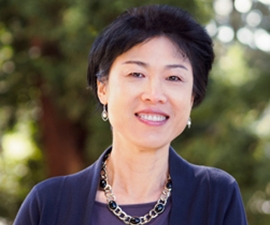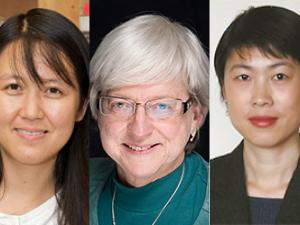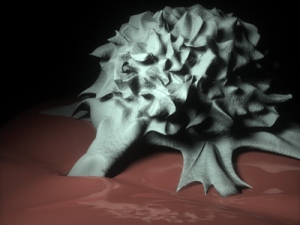

Research Bio
Kunxin Luo is a Professor of Cell Biology, Development and Physiology. Her research group interested in the signal transduction pathways downstream of the transforming growth factor beta (TGFb) receptors and the role these pathways play in regulation of mammary epithelial cell differentiation and breast carcinogenesis. They wish to understand how TGFb induces a wide range of biological activities and identify components of the TGF beta receptor signaling pathways.
Current Projects
The TGF beta family of cytokines plays important roles in tumor suppression, cell differentiation and tissue morphogenesis, and extracellular matrix production. TGFb exerts its diverse effects through the cell surface types I and II receptors (TbRI and TbRII), which possess serine/threonine kinase activities, and downstream Smad proteins. Loss of functional TGFb receptors and/or Smad proteins results in abnormal cell overproliferation, and this may contribute to the cause and progression of many types of human cancer including breast cancer, lymphoma, colon cancer and pancreatic cancer. A better understanding of the mechanism of TGFb receptor signal transduction is therefore a crucial first step towards a better understanding and treatment of human cancer.
Current model of TGFb signaling: Binding of TGFb to the cell surface receptors results in activation of receptor kinases, which then phosphorylate and activate downstream Smad2 and Smad3 proteins. Phosphorylated Smad2 and Smad3 then form heteromeric complexes with Smad4 and translocate to the nucleus where they activate transcription of multiple TGFb response genes.
They are interested in understanding how this relatively simple pathway mediates such a wide variety of TGFb-induced signals and what role this pathway plays in mammary gland development and breast cancer. Our current research is designed to address the following questions:
How does Smad proteins activate a wide range of TGFb-induced biological functions and how is this signaling pathway regulated? Our working hypothesis is that the Smad proteins activate multiple TGFb target genes by interacting with different cellular partners. Our goal is, then, to identify these cellular partners and to investigate the roles these molecules play in regulation of Smad function. Using biochemical approaches, they have identified several molecules interacting with different Smad proteins. Interestingly, two of the molecules they identified, Ski and SnoN, are both oncogene products. These oncoproteins, when overexpressed, can induce transformation of cells. They found that Ski and SnoN can interact with Smad2, Smad3 and Smad4 on a TGF beta responsive element and repress the ability of the Smads to activate TGF beta target genes. Overexpression of Ski or SnoN renders cells resistant to TGFb-induced growth inhibition. This ability to inactivate the tumor suppressor activity of the Smads may be partially responsible for the transforming activity of Ski and SnoN. Current studies focus on how expression of Ski and SnoN is regulated in normal and cancerous cells, and how interaction of Ski/SnoN with the Smad proteins regulates carcinogenesis and embryonic development. They are also investigating the function of other Smad-interacting proteins they have identified.
What is the role of TGF beta signaling pathway in mammary epithelial cell differentiation and breast cancer? In vitro studies using tissue culture cell lines allow us to carry out biochemical studies to understand the function and regulation of individual signaling molecules. Once this goal is achieved, they wish to apply this knowledge to an in vivo system and try to understand the role of the signaling pathway in a complex biological process. For this, they will use mammary epithelial cell differentiation and breast cancer as a model system. By introducing dominant negative and constitutive active mutants of TGFb signaling molecules, they will attempt to address the importance of TGFb signaling in different stages of mammary epithelial cell differentiation and how deregulation of TGFb signaling contributes to breast cancer.
Research Expertise and Interest
signal transduction pathways, mechanisms controlling the receptor kinases, regulation of mammary epithelial cell differentiation, breast carcinogenesis
In the News
New Awards Fund Work Between U.S., Chinese Women Scientists
In 2009, cell biologist Lin He changed the direction of her research after a surprisingly fruitful collaboration with a woman scientist in Beijing. The same program that funded that successful project, the Chau Hoi Shuen Foundation Women in Science Program, is now supporting He and two other women faculty for similar collaborations with Chinese women scientists.
Disabling enzyme reduces tumor growth, cripples cancer cells, study finds
Knocking out a single enzyme dramatically cripples the ability of aggressive cancer cells to spread and grow tumors, offering a promising new target in the development of cancer treatments, according to a new study by researchers at the University of California, Berkeley.
Four faculty members named fellows of AAAS
Four University of California, Berkeley, faculty members have been named fellows of the American Association for the Advancement of Science (AAAS), the association announced today (Thursday, Nov. 29).


